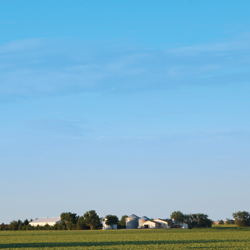Managing Decisions on the Farm

With the ever-changing nature of agriculture today, it’s more important than ever to enlist the help of trusted advisors.
In just one generation, farming has changed dramatically. Certainly, the technology has changed, but in this information age—in this smaller, more connected world—decisions are more complex in agriculture, and riskier. It’s easier than ever to make a mistake that can doom a farming business.
A generation ago, corn sold for $1 to $2/bushel. Yields were lower. Seed was cheaper because it didn’t contain a bunch of fancy technology. Back then, a typical family farm was several hundred acres with cattle, hogs and perhaps dairy. Now, we have corn that sells up around $7/bushel and farmers who sometimes partner with a hundred landlords to parcel together enough of an operation to support more than one family. Inputs, like seed, cost a lot more. Decisions are just more complex.
The gravity of making right decisions can sometimes be measured in the financial or land losses when wrong decisions are made. A couple of years ago, a very large farming operation amassed mistakes reaching $18 million over a period of six months. At the time, the farm was 12,000 acres. Crops were sold forward at relatively low prices (a marketing mistake) and not insured (a crop insurance mistake) when hail and flooding hit. When crops are sold forward, then not produced, and prices increase, a farmer has to buy higher-priced commodities in order to deliver on the sales contract for the promised grain. Financial difficulties on the farm typically start as production problems, which are then amplified with poor insurance and marketing decisions, and that’s what happened here.
In agriculture, we rely on trust—farming practices we trust, suppliers we trust, and the list goes on. Often, the trust we count on comes from familiarity or even just habit. One challenge with relying on trust that comes only from familiarity is that we can hold back from building new trusting relationships that might help us solve problems faced by a rapidly changing business.
An interesting view of trust was pointed out by a client who was looking for expertise in a different part of his business. Even though he had a friend who could help him, the client felt reluctant to work with that friend in a business relationship. When I asked why he was concerned, he said he wasn’t worried about confidentiality, but was concerned that he wouldn’t get the level of service he expected due to the relationship they already had. He had done business with friends before and felt that he had been taken advantage of because they didn’t have to work as hard to earn his business.
This example highlights the need for the skills of building “new trust.” One of the most important elements that top farm leaders master in order to build trust is setting and managing expectations. More often than not, trust is broken when expectations haven’t been understood or met.
In working with this client, we established an understanding that in the past his disappointment had come from him and his supplier not having the same expectations of each other. We then identified what he would expect from a new supplier—what would be provided, who would be doing it, how they would communicate and when these things would occur. By walking through this, he gained the confidence to lay out his vision for a successful relationship.
While every person has his or her own definition of what trust means, it can be broken down into three key areas:
- Communication. Do we openly share information, admit mistakes and seek understanding?
- Character. Is there consistency and clear expectations, and do we keep each other’s best interest in mind?
- Competence. Does this person have the skills needed for the problem at hand, and can they teach those skills?
Keeping these three elements in mind when developing new trust or evaluating longstanding relationships could lead to more confidence in your team. It could help you find and address gaps in service and communication, and it might just bring a different perspective about the people needed in order to develop a successful team.
Moving forward, think about the relationships in which you feel trust has been an issue. Crop insurance was obviously very important this past year, with much of the Midwest suffering from drought. This is one of the areas where farmers may have been testing trusted relationships because of the circumstances and outcomes. Sometimes, farmers who bought crop insurance wanted to buy cheaper insurance, and so an agent (a trusted advisor) may have recommended taking the Harvest Price Exclusion in order to cheapen the premium. Some farmers paid the price for that piece of advice.
One of our employees was out meeting with new growers (not company clients) and asked how things went with crop insurance during the past season. In one day, three of the five growers that he met had made that Harvest Price Exclusion mistake. The difference in indemnity payments for those three growers combined totaled $6 million. Granted, these were larger farms, but that’s the nature of agriculture today: Larger farms and larger potential mistakes.
With the unpredictable world of agriculture, it’s more important than ever to enlist the help of trusted advisors who can help you manage the decisions on your farm and bring expertise to the table. The legacy of your farm may depend on it. iBi
Darren Frye is president and CEO of Water Street Solutions.

